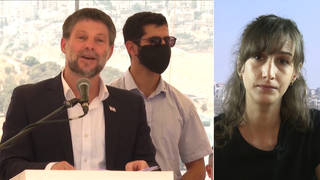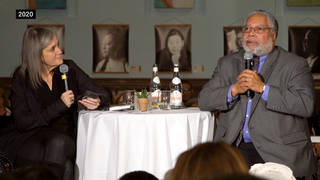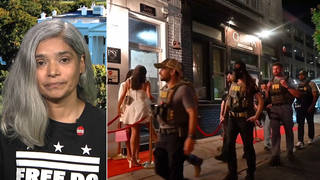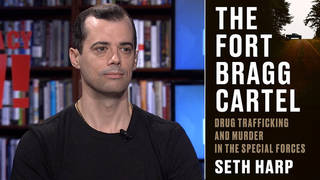
Death row prisoner Stanley Tookie Williams is scheduled to die by lethal injection at 12:01 am PT. Tuesday unless California Governor Arnold Schwarzenegger intervenes and grants clemency. On Sunday, the California Supreme Court unanimously denied an emergency request by his lawyers to halt his execution. We speak with Barbara Becnel and play an excerpt of our interview with Williams from San Quentin death row. [includes rush transcript]
We look at the case of death row prisoner Stanley Tookie Williams. 51 year-old Stanley Williams will die by lethal injection at 12:01 a.m. Tuesday unless California Governor, Arnold Schwarzenegger intervenes and grants clemency. On Sunday, the California Supreme Court unanimously denied an emergency request by his lawyers to halt his execution. Williams is a convicted murderer and the co-founder of one of the country’s most notorious street gangs, the Crips. But since his incarceration he has also become a Nobel Peace Prize nominee, children’s author and a vocal advocate against gang violence.
Stanley Tookie Williams’ life rests in the hands of Governor Arnold Schwarzenegger who has the power to commute the death sentence. Last Thursday, Schwarzenegger heard presentations from Williams” attorneys and Los Angeles County prosecutors about whether to grant Williams clemency. An international campaign to save his life has also grown over the last few weeks. Hip hop star Snoop Dogg and actor Jamie Foxx participated in the Save Tookie Day last week, reading excerpts from Williams” books. Foxx starred in a film about Tookie’s life titled Redemption. To date over 32,000 people have signed online petitions calling for Schwarzenegger to commute the death sentence.
The story of Tookie Williams begins in the streets of Los Angeles in the early 1970s. At the age of 17 he started the Crips street gang with his friend Raymond Washington. The gang would expand across the country and even overseas. In 1979 Williams was arrested in connection with four murders. _He was convicted of shooting dead a 7-Eleven clerk named Albert Owens and of robbing and killing a Taiwanese motel owner along with his wife and daughter. He was sentenced in 1981 to four death sentences. Tookie Williams has always maintained his innocence and claims he received an unfair trial, in part, because he was convicted by an all-white jury. In 1993, Tookie began speaking out against gang violence. With the help of his main advocate, Barbara Becnel, Williams soon began writing children’s books and speaking with young people about the gang life. He also helped orchestrate truces between gangs.
Linda Owens, the widow of Albert Owens, issued a statement on Friday in support of Williams” efforts to bring an end to gang violence. She said, “I invite Mr. Williams to join me in sending a message to all communities that we should all unite in peace. This position of peace would honor my husband’s memory and Mr. Williams work.”
Judges who have reviewed the case have conceded that there is a strong case for clemency. In 2002, a three-judge panel on the U.S. 9th Circuit Court of Appeals upheld his death sentence but in a rare move urged then-Governor Gray Davis to consider commuting the death sentence. The judges praised Tookie Williams for his “laudable efforts opposing gang violence” and his “good works and accomplishments since incarceration.” We recently spoke to Tookie from death row in San Quentin prison.
- Stanley Tookie Williams, Democracy Now! interview, November 30, 2005.
Go to the full interview
We speak with journalist Barbara Becnel.
- Barbara Becnel, journalist who helped Stanley Williams find a publisher for his books. She is also the co-author, with Stanley Williams, of the book “Life in Prison.”
Transcript
AMY GOODMAN: We recently spoke to Stanley Tookie Williams from death row in San Quentin. This is an excerpt of our conversation.
STANLEY TOOKIE WILLIAMS: I mean, where there’s life, there’s the ability to continuously strive to do whatever your purpose is or goal is in life. So, yes, if I’m alive, I can always strive forward to prove my innocence, regardless of how long it takes, even up to the last second of my life, and I’m 100 or whatever. You know what I mean? So, —
TELEPHONE RECORDING: You have 60 seconds left on this call.
STANLEY TOOKIE WILLIAMS: As I stated earlier in the conversation, that I have joie de vivre. So with this love of life, I have it. I assume that was forged down to me from my ancestors. So —
AMY GOODMAN: Well, in these last seconds that we have, they’re yours. What do you have to say?
STANLEY TOOKIE WILLIAMS: Well, I want to thank you for allowing me to be able to express my thoughts and feelings, and that as long as I have breath, I will continue to do what I can to proliferate a positive message throughout this country and abroad to youths everywhere, of all colors or gender and geographical area, and I will continue to do what I can to help. I want to be a part of the — you know, the solution.
AMY GOODMAN: With that, the phone cut off. Stanley Tookie Williams had his allotted 15-minute phone call from San Quentin Prison from his cell. We spoke with him two weeks ago. We’re joined on the phone now by Barbara Becnel, co-author with Stanley Williams of his book, Life in Prison. Welcome to Democracy Now!, Barbara Becnel.
BARBARA BECNEL: Good morning. Thank you for inviting me.
AMY GOODMAN: It’s good to have you with us. I know you’re under enormous pressure right now. When did you last see Stanley Tookie Williams?
BARBARA BECNEL: I saw him yesterday afternoon about 12:30 or 1:00 in the afternoon.
AMY GOODMAN: Can you talk about the last-minute filing that you did just before the weekend?
BARBARA BECNEL: Well, we actually — part of the fight was not something that we could have imagined. The fight, part of that fight, was a fight to prove his innocence that came out of a call, an unsolicited call that we received from a total stranger, who had read in the newspaper about one of the jailhouse informants that had been used, their testimony had been used against him, and this guy in reading that realized that this was one of his former cell mates in the L.A. County Jail at the same time Stan was there, and he realized that this guy, who had promised to lie and perjure himself on the witness stand in order to lower his own sentence — he was facing the death penalty for kidnapping, rape, murder and mutilaton — and because this guy wanted to lower, get off of death row himself, or the potential of landing on death row — he had not been tried yet — he had told his cell mate that he was going to make up some lies, and to lower his sentence in order to make up lies against Stan, with the help of representatives of the Los Angeles County Sheriff’s Department, feeding him information from Stan’s police files.
And then this guy — all of these [inaudible] — his cell mate reads the newspaper, that this guy testified against Stan and contributed to Stan facing execution now. And he was just shocked that the guy had made good his threat almost three decades before, and he called to tell us, come talk to him, because he could give us vital information that really spoke to Stan’s innocence. So, we rushed — we sent an investigator there. He signed an affidavit. He is extremely credible, and now we are hoping that Stan can live long enough to be able to really investigate this guy’s —- his story, his testimony, and prove his innocence -—
AMY GOODMAN: What is his name?
BARBARA BECNEL: — and that’s what we’re waiting for?
AMY GOODMAN: His name?
BARBARA BECNEL: The guy’s name is Gordon Bradbury von Ellerman.
AMY GOODMAN: And why did he wait until now? I mean, this case has gotten tremendous attention, increasingly, and he is in California, where it’s getting the most attention. Why ’til this last minute to make this statement, which is extremely significant?
BARBARA BECNEL: Well, because unless you were willing to go on the internet and read some of the pleadings and petitions that both the District Attorney and Stan’s attorneys wrote, our media has actually not discussed much of Stan’s case, the details of Stan’s case. So, this guy, only on December 8, read a story that mentioned some of the details of the case and cited this guy’s name as someone who testified against Stan. So, yes, he had heard and read all about Stan, but he had not heard or read anything in the newspapers about the details of the case that was presented against him.
So, he read that for the first time on December 8 and immediately called. He actually called the NAACP in Compton and reached out to them immediately. So, he didn’t know. He didn’t know after all of these years that the guy who had been his cell mate and who had threatened to do this, to perjure himself in order to lower his sentence, that that guy had made good on that promise. So, he didn’t know.
AMY GOODMAN: Barbara Becnel, how did the last-minute plea, the last-minute hearing before the governor go on Thursday when Stanley Tookie Williams’s lawyers, when the prosecution presented their case for and against clemency?
BARBARA BECNEL: Well, from the only persons I have been able to talk to about this, of course, is Stan’s attorneys. They said that Governor Schwarzenegger was very balanced and even-keeled in the way he responded to both their presentation and the presentation of the Los Angeles County District Attorney, so that there was no real way to tell. So, they felt they had done a good job, but that the governor had been even-handed in his response. So, we’re still back to everything is speculation.
AMY GOODMAN: Barbara Becnel, the San Francisco Chronicle is reporting that there is still a chance that the Federal Court could intervene. What do you understand the chances to be?
BARBARA BECNEL: Well, Stan’s attorneys have, in fact, filed a federal habeas petition with the Ninth Circuit Court of Appeals, and also a petition is being filed this morning with the U.S. Supreme Court. So, there is that possibility that the Ninth Circuit or the U.S. Supreme Court will intervene. But, you know, we don’t know. Obviously, they’ll respond today. We’ll know before the end of the day if the Ninth Circuit is going to step in. We do know the beginning of last year, Ninth Circuit stepped in three-and-a-half hours before Kevin Cooper was to be executed and gave him a stay of execution. So, it is possible even in the 11th hour. It is possible.
AMY GOODMAN: And how is Stanley Tookie Williams spending this last day, what could be his last day, as he awaits to hear the governor’s decision?
BARBARA BECNEL: Well, his lawyers are going to be visiting him early in the morning. I will be visiting him, along with two of his other really good friends. We’re going to get there about 10:00 this morning, and we’re going to stay. He will be allowed to have visitors until about 5:00 or 6:00 this evening, and we intend to stay right up until the last minute, and hopefully — we’re still hopeful — that the governor will do the right thing by Stanley Tookie Williams and grant him clemency, if for no more than to give him the time to follow up on these disturbing documents or this disturbing affidavit that lays out a case of corruption on the part of the Los Angeles County Sheriff’s Department and the way in which they sort of co-opted and corrupted the testimony in Stan’s case in order to frame him. And that’s the language that this person uses, that they routinely did this to frame the persons they wanted to get a conviction for.
And so we’re hoping that Stan will be left alive long enough to prove his innocence, because what I will say is that I will not stop to prove Stan’s innocence and to get justice for Stan, and if Stan is not allowed that opportunity to live and see his name cleared, I will not stop until my natural death to prove that he was, in fact, innocent, and the day will come that I’ll be able to show that Arnold Schwarzenegger and the State of California, if he allows Stan to die, will have killed an innocent man, and I will not stop until the truth of what happened to Stan in this criminal justice system is proven. I will not stop.
AMY GOODMAN: Barbara Becnel, thank you very much for being with us, journalist who has been seeing Stanley Tookie Williams and co-wrote his book, Life in Prison_, with Stanley Tookie Williams. And we have the full “interview”:_SLASHLINK__ with Williams on our website at DemocracyNow.org. Thanks for being with us.












Media Options